英语重点句型及如何使用
英语语法解析重点掌握句型与语法规则

英语语法解析重点掌握句型与语法规则英语语法解析:重点掌握句型与语法规则在学习英语的过程中,掌握句型和语法规则是非常重要的。
正确使用句型和语法规则可以使我们的英语表达更加准确、流畅,同时也能够避免一些常见的语法错误。
本文将介绍一些常用的句型和语法规则,并提供一些例句以供参考。
一、主谓一致主谓一致是指主语与谓语在人称和数上要保持一致。
如果主语是第三人称单数,则谓语动词要加上“-s”或“-es”。
例句:1. She likes to read books.(她喜欢读书。
)2. The cats play with each other.(这些猫互相玩耍。
)二、宾语宾语是动词的补充成分,可分为直接宾语和间接宾语。
1. 直接宾语是动作的承受者或所影响的对象。
2. 间接宾语是直接宾语的间接所在之处或所给予之者。
例句:1. He gave me a present.(他给了我一个礼物。
)2. They showed us their photos.(他们给我们看了他们的照片。
)三、条件句条件句用于表达某个条件下可能发生的结果,可以分为三种类型:零条件句、一般条件句和虚拟条件句。
1. 零条件句用于表示客观真理或普遍性的条件。
例句:Water boils at 100 degrees Celsius.(水会在100摄氏度沸腾。
)2. 一般条件句用于表示可能发生的条件和结果。
例句:If it rains, we will stay at home.(如果下雨,我们就会待在家里。
)3. 虚拟条件句用于表示不太可能实现的条件和结果。
例句:If I were you, I would study harder.(如果我是你,我会更加努力学习。
)四、被动语态被动语态用于表示主语是动作的承受者而不是执行者。
被动语态的构成:be动词(根据时态变化)+ 过去分词例句:1. The book was written by Mark Twain.(这本书是马克·吐温写的。
小学英语(3—6年级重点句型及语法)

小学英语(3—6年级重点句型及语法)三年级上册1、向别人问好应该说――A: Hello! (你好!) B: Hi! (你好!)2、问别人的名字应该说-A:What’s your name?你的名字是什么?B:My name’s Chen Jie. 我的名字是陈洁。
3、跟别人分手应该说――A: Bye.\ Good bye!(再见)B: See you.(再见) \ Goodbye.(再见)4、A: I have a pencil\ bag\ruler 我有一只铅笔\书包\尺子。
B: Me too . 我也有。
5、早上相见应该说-――A: Good morning. 早上好!B: Good morning! 早上好!6、下午相见应该说――A: Good afternoon! 下午好!B: Good afternoon! 下午好!7、跟新朋友第一次见面――A: Nice to meet you! 见到你很高兴。
B: Nice to meet you,too! 见到你也很高兴!8、A: Let’s go to school! 让我们一起去上学!B: OK! 好的。
9、看见久未见面的朋友或者别人身体不舒服,你该这么打招呼-A: How are you ? 你好吗?B: Fine,thank you我很好,谢谢你。
10、A: Let’s paint. 让我们画画。
B: Great! 棒极了!11、A: Look I have a rabbit\monkey. 看,我有一只兔子\猴子。
B: Cool\Super \ Great \ Wow! 酷\超级好\棒极了\好厉害.12、你想看下别人的东西,你该这么说――A: May I have a look? 我可以看一看吗?B: Sure. Here you are! 当然可以。
给你!13、请别人吃东西,你该这么说――A: Have some French fries. 吃一些炸薯条。
英语重点句型及如何使用

九年级Unit 1—8Unit 1Section 1A1.by介词,“通过…(方式,手段)”by making flashcards 通过做单词抽认卡by doing sth 通过…..方式(途径)。
例:I learn English by listening to tapes.②在…..旁边。
例:by the window/the door③乘坐交通工具例:by bus/car④在……之前,到……为止。
例:by October在10月前⑤被例:English is spoken by many people.2.read the textbook读/看教科书3.make vocabulary lists 列生词表4.listen to tapes听磁带5.ask sb for help向某人求助6.study for a test为备考学习7.watch videos观看录像8.practice sth练习某事;practice doing sth练习做某事Do you ever practice conversations with friends (与朋友对话)? I have to practice speaking English everyday.9.read aloud朗读10.that way=in that way 通过那种方式11.improve my speaking skills提高我的会话技巧12. too…to…太….而不能…It’s too hard for me to understand the article. = It’s so hard that I can’t understand the article.13. for example=for instance 例如14. ask about询问有关…;ask sb about sth向某人询问/打听有关…. We asked them about the best ways to learn more English. I want to ask about the use of the new machines.15. watch/see/hear sb do sth观看/看见/听见某人做过某事;watch/see/hear sb doing sth观看/看见/听见某人正在做某事 He can watch actors say the words. Can you hear him singing in the room?16. 辨析:sometime ;sometimes ;some times ;some time ①sometime在将来/过去的某一时间I’ll speak to him about it sometime. 我会找个时间和他谈谈这事. I met her sometime last year.去年的某个时候我见过她. ② sometimes = at times有时,偶尔It is sometimes hot and sometimes cold here. He sometimes writes to me. ③some time A.一些时间:It will take you some timeto walk there. B.在未来的某时=sometime: Phone me some time next week下个星期什么时候给我打电话吧. ④some times一些次,几次 I've told him the thing sometimes.17. join短语:①join sb加入到某人的活动中去②join in+活动项目"参加…活动" I'd like to join in the game. ③join+组织机构"加入到某个组织机构,成为其中的一个成员"join the Party; join the League, The best way to improve your English is to join an English club18. have fun 玩得高兴19. not at all 一点也不20. get excited 高兴、激动21. end up (vi.) 结束; 告终; 结果 ; 最后end up doing sth.We end up taking a taxi there .我们结果乘出租车去了那里. We sometimes end up speaking in Chinese.(以说汉语结束对话)22. do a survey 做调查;do a survey about针对…做调查 I'm doing a survey about learning English. 我在进行学习英语的调查。
高中英语常用重点句型总结(145条)
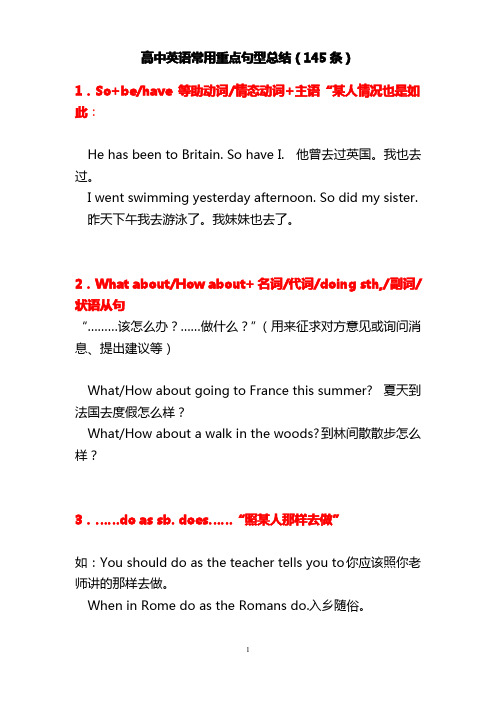
高中英语常用重点句型总结(145条)1.So+be/have等助动词/情态动词+主语“某人情况也是如此:He has been to Britain. So have I.他曾去过英国。
我也去过。
I went swimming yesterday afternoon. So did my sister.昨天下午我去游泳了。
我妹妹也去了。
2.What about/How about+名词/代词/doing sth,/副词/状语从句“………该怎么办?……做什么?”(用来征求对方意见或询问消息、提出建议等)What/How about going to France this summer?夏天到法国去度假怎么样?What/How about a walk in the woods?到林间散散步怎么样?3.……do as sb. does……“照某人那样去做”如:You should do as the teacher tells you to .你应该照你老师讲的那样去做。
When in Rome do as the Romans do.入乡随俗。
4.None of+名词/代词+do/does……“在……中没有任何一个做……”如:None of the telephones can work。
所有的电话都不能工作了。
None of them are/is interested in physics.他们中没有一个人对物理感兴趣。
5.Not+all+复数名词/不可数名词+are/is……“并非全部……”;“并不是所有的……”如:Not all the parts of the car will be made in the factory.并不是所有的汽车部件都在这家工厂制造。
Not all the students can pass the exam.并非所有的同学都能通过考试。
Not all factories here produce shirts.这儿的工厂不都生产衬衣。
七年级上册英语全单元重点句型总结
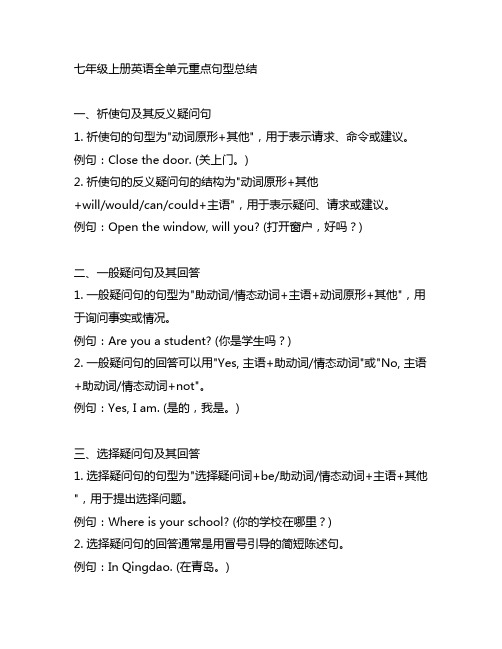
七年级上册英语全单元重点句型总结一、祈使句及其反义疑问句1. 祈使句的句型为"动词原形+其他",用于表示请求、命令或建议。
例句:Close the door. (关上门。
)2. 祈使句的反义疑问句的结构为"动词原形+其他+will/would/can/could+主语",用于表示疑问、请求或建议。
例句:Open the window, will you? (打开窗户,好吗?)二、一般疑问句及其回答1. 一般疑问句的句型为"助动词/情态动词+主语+动词原形+其他",用于询问事实或情况。
例句:Are you a student? (你是学生吗?)2. 一般疑问句的回答可以用"Yes, 主语+助动词/情态动词"或"No, 主语+助动词/情态动词+not"。
例句:Yes, I am. (是的,我是。
)三、选择疑问句及其回答1. 选择疑问句的句型为"选择疑问词+be/助动词/情态动词+主语+其他",用于提出选择问题。
例句:Where is your school? (你的学校在哪里?)2. 选择疑问句的回答通常是用冒号引导的简短陈述句。
例句:In Qingdao. (在青岛。
)四、特殊疑问句及其回答1. 特殊疑问句的句型为"特殊疑问词+be/助动词/情态动词+主语+其他",用于询问特殊信息。
例句:What's your name? (你叫什么名字?)2. 特殊疑问句的回答是根据问题的具体情况而定,通常是对问题的具体信息做出回答。
例句:My name is Tom. (我的名字叫汤姆。
)五、陈述句及其否定句1. 陈述句的句型为"主语+be/助动词/情态动词+其他",用于陈述事实、描述情况。
例句:She is from France. (她来自法国。
必修1高一英语第一模块第二单元重点句型词组汇总
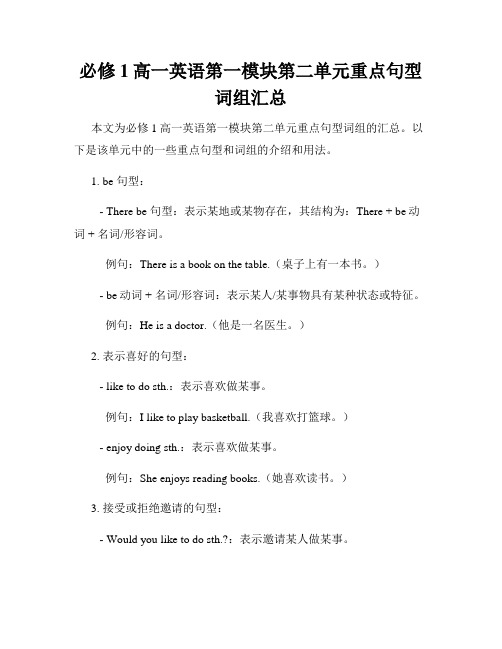
必修1高一英语第一模块第二单元重点句型词组汇总本文为必修1高一英语第一模块第二单元重点句型词组的汇总。
以下是该单元中的一些重点句型和词组的介绍和用法。
1. be 句型:- There be 句型:表示某地或某物存在,其结构为:There + be动词 + 名词/形容词。
例句:There is a book on the table.(桌子上有一本书。
) - be动词 + 名词/形容词:表示某人/某事物具有某种状态或特征。
例句:He is a doctor.(他是一名医生。
)2. 表示喜好的句型:- like to do sth.:表示喜欢做某事。
例句:I like to play basketball.(我喜欢打篮球。
)- enjoy doing sth.:表示喜欢做某事。
例句:She enjoys reading books.(她喜欢读书。
)3. 接受或拒绝邀请的句型:- Would you like to do sth.?:表示邀请某人做某事。
例句:Would you like to go shopping with me?(你愿意和我一起去购物吗?)- I'm sorry, but I can't.:表示拒绝邀请。
例句:I'm sorry, but I can't go with you.(对不起,我不能和你一起去。
)4. 表示允许或禁止的句型:- You can/can't do sth.:表示允许/禁止某人做某事。
例句:You can use my computer.(你可以使用我的电脑。
) - It's allowed/not allowed to do sth.:表示允许/禁止做某事。
例句:It's not allowed to smoke here.(这里不允许吸烟。
)5. 表示请求的句型:- Can/Could you do sth.?:表示请求某人做某事。
初三重点英语单词句型及语法
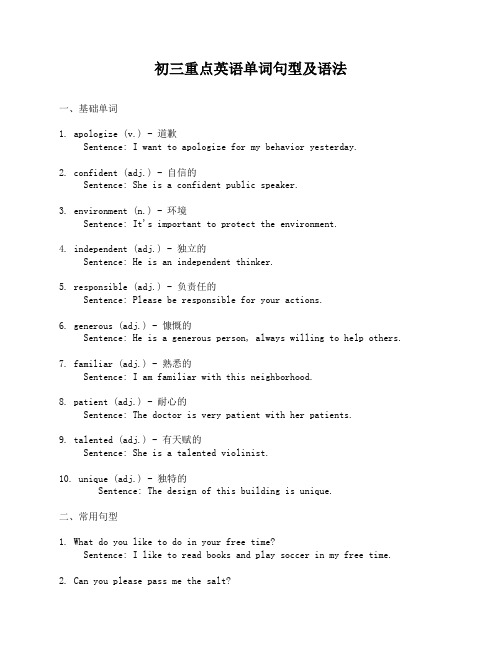
初三重点英语单词句型及语法一、基础单词1. apologize (v.) - 道歉Sentence: I want to apologize for my behavior yesterday.2. confident (adj.) - 自信的Sentence: She is a confident public speaker.3. environment (n.) - 环境Sentence: It's important to protect the environment.4. independent (adj.) - 独立的Sentence: He is an independent thinker.5. responsible (adj.) - 负责任的Sentence: Please be responsible for your actions.6. generous (adj.) - 慷慨的Sentence: He is a generous person, always willing to help others.7. familiar (adj.) - 熟悉的Sentence: I am familiar with this neighborhood.8. patient (adj.) - 耐心的Sentence: The doctor is very patient with her patients.9. talented (adj.) - 有天赋的Sentence: She is a talented violinist.10. unique (adj.) - 独特的Sentence: The design of this building is unique.二、常用句型1. What do you like to do in your free time?Sentence: I like to read books and play soccer in my free time.2. Can you please pass me the salt?Sentence: Sure, here you go.3. I'm sorry, but I can't attend the party tonight.Sentence: That's okay, maybe next time.4. How was your weekend?Sentence: My weekend was great, I went hiking with my family.5. Could you please help me with my homework?Sentence: Of course, I would be happy to help.6. What time does the movie start?Sentence: The movie starts at 7:30 PM.7. Where is the nearest bus stop?Sentence: The nearest bus stop is just around the corner.8. I'm really excited about the school trip next week.Sentence: Me too, it's going to be a lot of fun.9. What do you want to be when you grow up?Sentence: I want to be a doctor and help people.10. How do you spell your name?Sentence: My name is spelled J-O-H-N.三、语法1. Present Simple Tense (一般现在时)- 表示经常发生的动作或事实。
英语语法重点内容
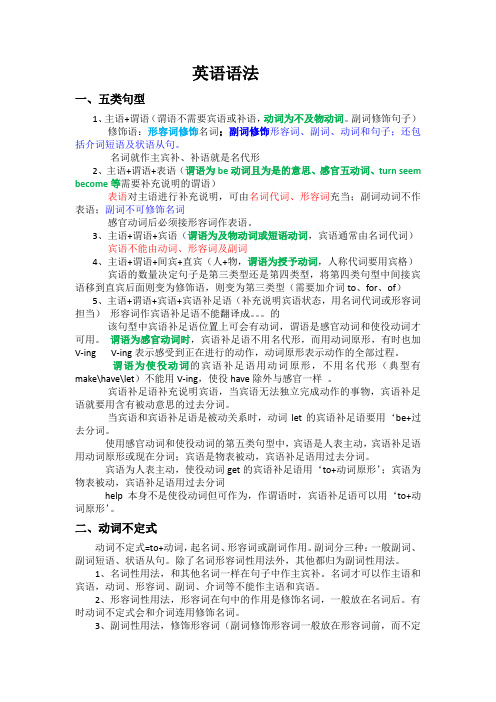
英语语法一、五类句型1、主语+谓语(谓语不需要宾语或补语,动词为不及物动词。
副词修饰句子)修饰语:形容词修饰名词;副词修饰形容词、副词、动词和句子;还包括介词短语及状语从句。
名词就作主宾补、补语就是名代形2、主语+谓语+表语(谓语为be动词且为是的意思、感官五动词、turn seem become等需要补充说明的谓语)表语对主语进行补充说明,可由名词代词、形容词充当;副词动词不作表语;副词不可修饰名词感官动词后必须接形容词作表语。
3、主语+谓语+宾语(谓语为及物动词或短语动词,宾语通常由名词代词)宾语不能由动词、形容词及副词4、主语+谓语+间宾+直宾(人+物,谓语为授予动词,人称代词要用宾格)宾语的数量决定句子是第三类型还是第四类型,将第四类句型中间接宾语移到直宾后面则变为修饰语,则变为第三类型(需要加介词to、for、of)5、主语+谓语+宾语+宾语补足语(补充说明宾语状态,用名词代词或形容词担当)形容词作宾语补足语不能翻译成。
的该句型中宾语补足语位置上可会有动词,谓语是感官动词和使役动词才可用。
谓语为感官动词时,宾语补足语不用名代形,而用动词原形,有时也加V-ing V-ing表示感受到正在进行的动作,动词原形表示动作的全部过程。
谓语为使役动词的宾语补足语用动词原形,不用名代形(典型有make\have\let)不能用V-ing,使役have除外与感官一样。
宾语补足语补充说明宾语,当宾语无法独立完成动作的事物,宾语补足语就要用含有被动意思的过去分词。
当宾语和宾语补足语是被动关系时,动词let的宾语补足语要用‘be+过去分词。
使用感官动词和使役动词的第五类句型中,宾语是人表主动,宾语补足语用动词原形或现在分词;宾语是物表被动,宾语补足语用过去分词。
宾语为人表主动,使役动词get的宾语补足语用‘to+动词原形’;宾语为物表被动,宾语补足语用过去分词help本身不是使役动词但可作为,作谓语时,宾语补足语可以用‘to+动词原形’。
- 1、下载文档前请自行甄别文档内容的完整性,平台不提供额外的编辑、内容补充、找答案等附加服务。
- 2、"仅部分预览"的文档,不可在线预览部分如存在完整性等问题,可反馈申请退款(可完整预览的文档不适用该条件!)。
- 3、如文档侵犯您的权益,请联系客服反馈,我们会尽快为您处理(人工客服工作时间:9:00-18:30)。
九年级Unit 1—8Unit 1Section 1A1.by介词,“通过…(方式,手段)”by making flashcards 通过做单词抽认卡by doing sth 通过…..方式(途径)。
例:I learn English by listening to tapes.②在…..旁边。
例:by the window/the door③乘坐交通工具例:by bus/car④在……之前,到……为止。
例:by October在10月前⑤被例:English is spoken by many people.2.read the textbook读/看教科书3.make vocabulary lists 列生词表4.listen to tapes听磁带5.ask sb for help向某人求助6.study for a test为备考学习7.watch videos观看录像8.practice sth练习某事;practice doing sth练习做某事Do you ever practice conversations with friends (与朋友对话) I have to practice speaking English everyday.9.read aloud朗读10.that way=in that way 通过那种方式11.improve my speaking skills提高我的会话技巧12. too…to…太….而不能…It’s too hard for me to understand the article. = It’s so hard that I can’t understand the article.13. for example=for instance 例如14. ask about询问有关…;ask sb about sth向某人询问/打听有关…. We asked them about the best ways to learn more English. I want to ask about the use of the new machines.15. watch/see/hear sb do sth观看/看见/听见某人做过某事;watch/see/hear sb doing sth观看/看见/听见某人正在做某事 He can watch actors say the words. Can you hear him singing in the room16. 辨析:sometime ;sometimes ;some times ;some time ①sometime在将来/过去的某一时间 I’ll speak to him about it sometime. 我会找个时间和他谈谈这事. I met her sometime last year.去年的某个时候我见过她. ②sometimes = at times有时,偶尔It is sometimes hot and sometimes cold here. He sometimes writes to me. ③some time A.一些时间:It will take you some timeto walk there. B.在未来的某时=sometime: Phone me some time next week下个星期什么时候给我打电话吧. ④some times一些次,几次 I've told him the thing sometimes.17. join短语:①join sb加入到某人的活动中去②join in+活动项目"参加…活动" I'd like to join in the game. ③join+组织机构"加入到某个组织机构,成为其中的一个成员"join the Party; join the League, The best way to improve your English is to join an English club18. have fun 玩得高兴19. not at all 一点也不20. get excited 高兴、激动21. end up (vi.) 结束; 告终; 结果 ; 最后end up doing sth.We end up taking a taxi there .我们结果乘出租车去了那里. We sometimes end up speaking in Chinese.(以说汉语结束对话)22. do a survey 做调查;do a survey about针对…做调查 I'm doing a survey about learning English. 我在进行学习英语的调查。
23. keep an English notebook 记英语笔记Section 1B1.spoken English英语口语;written English书面英语2.make mistakes/make a mistake犯错误3.get the pronunciation right 使发音准确4.practice speaking English 练习说英语5.first of all 首先6.to begin with 一开始te on 随后8. be afraid to do因为害怕而不敢做某事I'm afraid to speak in class.9. in class 在课堂上ugh at sb嘲笑某人;laugh at sth因为某事而发笑11.make sentences造句12.辨析: too , also , either: too, also用于肯定句 ,疑问句;also用于行前be后,情后助后 ; either用于否定句,置句末13.decide to do sth决定做某事14.take notes做笔记15.have trouble doing sth在…方面有困难 If you have some trouble spelling new words , you can look them up in the dictionary.16. enjoy doing 喜欢干17. be impressed 深受感动impress sth on sb/impress sb with sth使某人铭记某事18.write down 写下、记下19.look up(v-adv)“查字典”20. feel+形容词“感觉起来…”21. native speakers 说本族话的人22. make up 组成、构成23. as当作…Most people speak English as a second language.You can use the book as your textbook.Regard problems as challenges.24. around the world 全世界1Reading1.deal with处置How do you deal with your problem2. unless连词“除非…否则…”(不用于假想的事) Unless you start at once , you will be late. 除非你马上出发,否则你要迟到了.Nobody , unless Tom can help you. 除了汤姆别人帮不了你。
3.worry about (be worried about)担心、担忧4.be angry with 生某人的气5.stay angry 生气6.go by 消逝7. affect (vt.)影响,感动 Worrying about our problem affects how we do at home.8. have disagreements有分歧 ,意见不同9. regard…as…把……当做……plain about…抱怨…Many students complain about school. He often complains about the weather here.11.change…into…把…转变为…We must learn how to change problems into challenges.12.try one's best to do sth尽力做某事13.with the help of 在...的帮助下14.think of (think about) 想起、想到pare A to B 把A比作BScientists sometimes compare the human brain to a computer. 科学家有时将人脑比作电脑。
16. physical problems 身体上的问题17. face the challenge面对挑战18. forget about (口语)不要放在心上;忘掉 Did you forget about the meeting He forgot about sweeping the floor .19. break off 中断break off a friendship断绝友谊;断交20. in a way用某种方式 ;in a positive way以正面的方式Unit 2Section 2Aed to do过去常常作某事,表示以往的事实或情况He used to be tall , didn’t he Yes, he did. No, he didn’t.2.Over here! = Come over here! 到这边来!过来!3.play the piano 弹钢琴4.be interested in 对…感兴趣.5. be on a team 加入…队 I'm on a swim team.6.People sure change.人确实在变7.be afraid of ⑴害怕,畏惧:be afraid of sth /doing sth 害怕…I used to be afraidof the dark. Fred is afraid of flying. He feels anxious before he gets on the plane. He is afraid of going /to go out alone at night. 他害怕夜晚独自出去。
